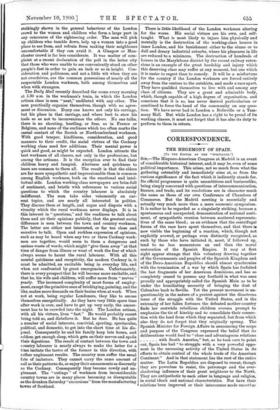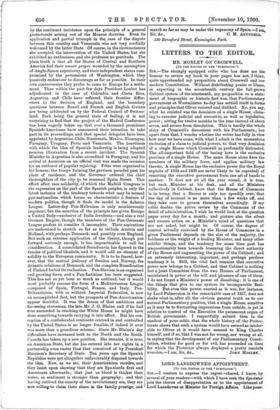CORRESPONDENCE.
THE HEGEMONY OF SPAIN.
[To THE EDITOR OF THE " SPECTATOR:1
SIR,—The Hispano-American Congress at Madrid is an event of considerable historical interest, and, it may be, even of some political importance. This arises, not so much from what the gathering ostensibly and immediately aims at, as from the curious significance of the fact which it indirectly stands for. Its official programme is quite unambitious and businesslike, being simply concerned with questions of intercommunication, finance, and trade, and its resolutions are in character much the same as those of our own Conference of Chambers of Commerce. But the Madrid meeting is essentially and actually very much more than a mere economic symposium. It is rather to be regarded as a singularly striking, because a spontaneous and unexpected, demonstration of national senti- ment, of sympathetic reunion between scattered representa- tives of the same blood ; as an evidence that the centrifugal forces of the race have spent themselves, and that there is now visible the beginning of a reaction, which, though not explicitly avowed, or perhaps even distinctly recognised, as such by those who have initiated it, must, if followed up, . tend to no less momentous an end than the moral restoration of the Spanish Empire. It may at first sight appear strange that this voluntary drawing together of the Governments and peoples of the Spanish Kingdom and of the Ibero-American Republics should almost synchronise with the termination of a war by which Spain has forfeited the last fragments of her American dominions, and has so completely ceased to possess any foothold in what was once proudly and appropriately called the Spanish Main as to be under the humiliating necessity of bringing the dust of Columbus back to Seville. Yet the present movement is un- questionably in the nature of a protest against the disastrous issue of the struggle with the United States, and in the extremity of her fallen fortunes the defeated mother-country finds her erstwhile rebellious children oversea prompt to emphasise the tie of kinship and to consolidate their connec- tion with the land from which they separated, but from which also they do not forget that they originally sprung. The Spanish Minister for Foreign Affairs in announcing the scope and purpose of the Congress expressed the belief that its deliberations would lead to " close and advantageous relations
with South America," but, as he took care to point out, Spain has had " to struggle with a very powerful oppo- nent in the unceasing activity of the United States in its efforts to obtain control of the whole trade of the American Continent." And in that statement lies the root of the entire matter. The Latin Republics are disposed to resent, though they are powerless to resist, the patronage and the over- shadowing influence of their great neighbour to the North. They are antipathetic to each other in language and religion, in social ideals and national characteristics. Nor have their relations been improved or their intercourse made smootIvr
by the continued, insistence upon the principle of a .general protectorate arising out of the Monroe doctrine. Even its application and partial triumph in the case of the dispute between this country and Venezuela was not very cordially welcomed by the latter State. Of course, in the circumstances she accepted the intervention of the United States, but she exhibited no enthusiasm and she professes no gratitude. The plain truth is that all the States of Central and Southern America feel their amour propre wounded by the assumption of Anglo-Saxon superiority, and their independent status com- promised by the pretensions of Washington, which they Passively endeaiour to discourage as far as possible. In their Own controversies they prefer to come to Europe for a settle- ment. Thus within the past few days President Loubet has adjudicated in the case of Colombia and Costa Rica, Argentina and Chile have referred their frontier differ- ences to the decision of England, and the . boundary questions between Brazil and French and English Guiana are being arbitrated on by the Federal Council of Switzer- land. Such being the general state of feeling, it is not surprising to find that the project of the Madrid Conference has been eagerly taken up, that over a thousand prominent Spanish-Americans have announced their intention to take Part in its proceedings, and that special delegates hive been appointed by Argentina, Chile, Guatemala, Mexico, Nicaragua, Paraguay, Uruguay, Peru, and -Venezuela. The heartiness With which the idea of Spanish leadership is being adopted receives illustration from a recent incident. The Spanish Minister .to Argentina is also accredited 'to Paraguay, and his arrival at AsunCion on an official visit was made the occasion foran outburst of 'popular rejoicifik. - Fetes Were organised in his honour; the troops -formingthe garrison paraded past his place of, residence, and the GoiernOr ordered the chief thoroughfare of the city to be renamed. Spain Street. This effort after race Solidarity., of -Which. the Madrid Congress is the expression on the part Of" the Spanish peoples, is only the latest instance of the tendency towards what may, be termed pan-nationalism which forms so characteristic a feature of modern politics, though it finds its model in the Achman Leap,. Latter-day Pan-Hellenism is only mischievously impotent, but the assertion of the principle has given Europe a United Italy—exclusive of Italia Irredenta—and also a real German Empire, though the "members of the Pan-Germanic League profess to consider it incomplete. Their aspirations are understood to stretch so far as to include Austria and Holland, with perhaps Denmark, and possibly even England. But such an extreme application of the theory, though put forward seriously enough, is too impracticable to call for consideration. A consolidated Scandinavia has figured in the fancies of political idealists, and it would add an element of solidity to the European community. It is to be feared, how- ever, that the mutual jealousy of Sweden and Norway, the dynastic relations of Denmark, and the complete Russification of Finland forbid its realisation. Pan-Slavism is an organised and growing force, and a Pan-Latinism has been suggested. This has not as yet been so much as outlined, but' it would most probably assume the form of a Mediterranean League composed of Spain, Portugal, France, and Italy. Pan- Britannicism, with or without Imperial Federation, is now an accomplished fact, but the prospects of Pan-Americanism appear doubtful. It was the dream of that ambitious and far-seeing statesman, the late Mr. J. G. Blaine, and if he had ever succeeded in reaching the White House he might have done something towards carrying it into effect. But his con- ception of a confederated continent centred in and controlled by the United States is no longer feasible, if indeed it ever was more than. a grandiose scheme. Since Mr. Blaine's day difficulties have increased both to the North and the South. Canada has taken up a new position. She remains, it is true, an American State, but she has entered into her rights in a partnership even vaster than that conceived of by President Harrison's Secretary of State. Ten years ago the Spanish Republics were not altogether unfavourably disposed towards the idea. Now, as we see, their Americanism recedes, and they insist upon showing that they are Spaniards first and Americans afterwards ; that just as blood is thicker than Water, so sentiment is stronger than geography ; and that having outlived the enmity of the revolutionary era, they are now willing to claim their share in the family prestige, and march so far as may be under the hegemony of Spain.—I az%







































 Previous page
Previous page